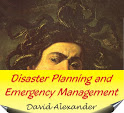On Monday, he came back and the table on which he left his rows of bags full of sand was empty. It had evidently recently been cleaned. He panicked and rushed around looking for his samples. Those were days when fire suppression technology was very much more rudimentary than it is now. Eventually he found a cleaner who took him round to the back of the building and showed him a row of red-painted fire buckets full of multi-coloured sand. He broke down and wept.
Two friends of mine, who were married to each other and living together, did research for their theses in English Literature. One day, when they were close to the end of their studies, they decided to have a barbecue. They grilled the meat on the balcony of their apartment. Unfortunately, this happened in North America and they lived in a wooden building. It had been a long, hot summer and everything was bone dry, including the wood of the balcony. They failed to put the barbecue grill out properly after they had used it and the building caught fire. It was consumed by the flames in nine minutes flat. No one was injured but the building was a write-off. My friends had written their theses and had made electronic copies of the files and had printed out hard copies as well. Unfortunately, they were all in the same place, namely, in the house. The hard copies were reduced to ashes, the computers melted and the disks were consumed by fire. My friends never graduated.
Recently, I caught a snippet of the local radio news. It said: "Police divers were out in the river looking for his thesis..." It reminded me of how works of scholarship were more prone to disaster in the pre-digital age. For example, the distinguished South African geomorphologist Lester King found that his houseboy had taken his thesis down to the rubbish dump and burned it, thinking he was doing a favour in cleaning all those disorderly pieces of paper out of King's office. King was another luminary who never got his doctorate. And then there was T.E. Lawrence, who forgot to reclaim the manuscript of Seven Pillars of Wisdom from the luggage rack when he left a railway carriage at Reading station. It was never found and he had to rewrite the whole, rather substantial, book from scratch. Thank goodness he did.
The moral of these stories is care, protection, redundancy and keep things at more than one site.

